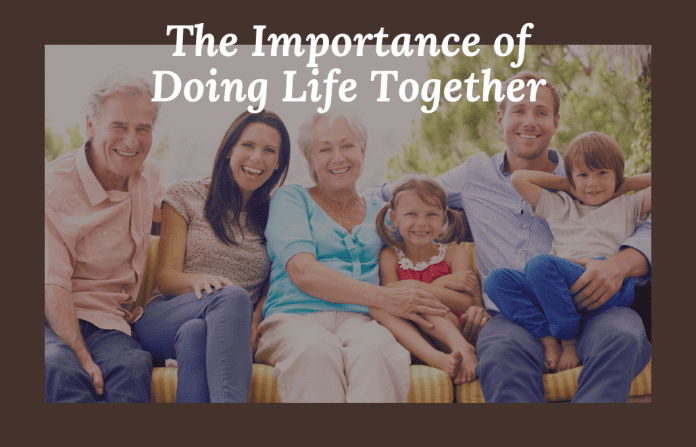There is a famous African proverb: It takes a village to raise a child. Well for many of us, that is going to be a problem.
Military families flit from place to place every two years or so (or less). Sometimes you win and have your own built in village. You all love each other’s children and are there through thick and thin. Sooner or later though, you or they will be moving on. It was nice while it lasted.
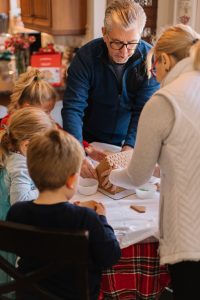 Occasionally I meet non-military families who grew up in an area and never left.
Occasionally I meet non-military families who grew up in an area and never left.
They live down the road from their parents and cousins. All their friends have remained the same since they were in nappies.
I must admit, whether rightly or wrongly, my initial knee jerk reaction is a cross between horror and confusion. It is so alien to me.
My mother left her family and country to marry my British father, then travelled and lived in the Middle East over the years with my father’s job. On at least one occasion, she didn’t see her family for 3 or 4 years. In fact, my parents still live miles away from their own children, across the world. Then I married a military man, and we moved and continue to move, always on the go. I’m forever gently encouraging him to do an overseas tour. I know firsthand the adventures and memories that can be made.
There is that saying by Rachel Wolchin that, “If we were meant to stay in one place, we would have roots and not feet.”
Modern life has evolved so that we can go and move where we want. Wherever the job is worldwide; whatever village, town or city that takes our heart; inside a city or the suburbs. The effect of this has meant that families are split, either across the world or at least the country.
This would never really be a problem ordinarily. But then the pandemic struck, and the world suddenly became both very, very big and very, very small. The locational divide that some families have became extremely apparent when travel was taken away from us. As a world, we began to remember the things that are important and the things that are not.
‘In 1940, about one-quarter of the U.S. population lived with three or more generations in one home. After WWII, American families largely became two-generational, with parents and minor-age children under one roof. Returning war veterans built suburbs and a new American family lifestyle through the 1950s. The percentage of households with multiple generations started declining to 21%, reaching a low of 12% by 1980’. – Sherri Shelling for Forbes magazine
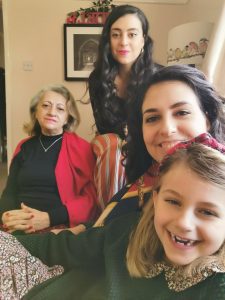
I can’t help but plunge into the past and how families used to look.
Multi-generational homes house three+ generations in and around each other, supporting and doing life together. I remember my mother telling me how important it was to socialise not only with people your own age but a variety of ages – especially older people. Being a young adult at the time, I didn’t really understand. There is wisdom in being around older people when you are young and can’t always see what they can. It is easy to become tunnel visioned.
For me, I loved my grandparents dearly, but living overseas meant I didn’t have close relationships with them. I have many fond memories of visits when we travelled back in the summer holidays, but this is not like “doing life” with your grandchildren. This experience was in direct contrast to my husband’s childhood, where he and his brother would stay at his paternal grandparents farmhouse almost every weekend.
Western society has evolved so much from what family structures used to look like.
I love reading about traditional Eastern family structures. In China for example, ‘…traditional families, including those living in a rural environment, many households include five generations living together. Even in modern households, many grandparents live with their children and their kids. They typically play a large role in the raising of their grandchildren.’ Don’t get me wrong five generations in one family feels a little excessive! But if you think about when we talk about family tribes in a modern context, ours pales in comparison to what family tribes in Asia look like on a daily basis.
I don’t believe there ever was a ‘golden age’ of the family, but I do believe that bringing up children was easier when families lived near each other and they could rely on the wisdom and support of the extended family. – Katharine Hill, author and UK Director of Care For The Family
In September 2020, my siblings and I received news my mother had fallen and broken her hip and shoulder. She would be flown back to the UK in a medical plane and operated on back home.
I remember feeling my heart drop from my chest to my feet. I knew that my siblings didn’t have the capacity to look after her once she was out of hospital, and I knew it would be a long road to recovery. My husband and I agreed she would come and live with us until she was ready to leave.
I had so many mixed feelings about this.
The kids, after a long period of homeschooling and then 6 weeks off over the summer, were finally going back to school. I had made big plans for my small businesses. I finally had the headspace and literal space to plough on. I had also gone to boarding school from age 14, so my mother and I hadn’t lived intensively together. She wouldn’t be able to stay in our spare room as she wouldn’t be able to get up the stairs. She’d be in our dining room.
It is a strange feeling when you realise your parents aren’t invincible.
Those first two weeks after she arrived were incredibly, emotionally draining seeing her like that. There was one day at the beginning that I had to go hide and have a cry into the open fridge. It took her a long time to come through the fog that she was in after being put under for her operation. I became her carer: giving her injections every night, sponge bathing her, making her food, and looking for clothes she might be able to get over her arm. I taught her how to shop online, what shops to look at, and how to return items. I’d coach her out on little walks up and down our road, increasing in distance as she gained her strength. Slowly she began to recover, and she seemed more like herself as she gradually began to mend.
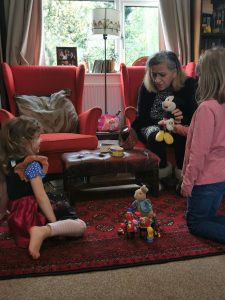
She stayed with us for almost six months. In those six months, there was another lockdown, more homeschooling, a work-from-home husband, and my three part time jobs. In that time though, my husband and I began to experience what it would be like to live near family.
We were able to go on long runs together at the weekend. We left the kids with her and to do errands without them. We walked the dog without having to hear the children whine because they don’t want to go.
More than that, I began to watch her relationship with the girls grow and grow.
My youngest would keep her company most mornings, either playing games, chatting, or reading. My mum learnt how to read the girls and their ups and downs. In the early days, I would come in to find my mother softly snoring, my youngest having completely tuckered her out. I joked she had finally met her match – she had been out-talked. On other occasions, she’d come to me, eyes glistening, to tell me one of them had told her they loved her so much.
My girls experienced being told off by a grandparent for probably one of the first times and the tears and shock that came from that. On Sundays, she would do Sunday school with them in the morning and reenact a story from the Bible in an elaborate display of costumed fun. It was so lovely to watch, and the girls really brought her to life again. Children have a way of doing that.
Though it does sound rosy, it was quite a stressful time for me.
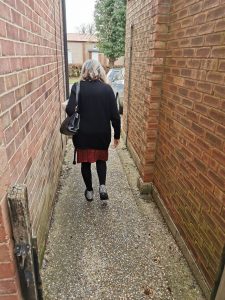 I felt like I was juggling constantly. She once commented that I never stopped, from the moment I got up until I went to bed. In hindsight, I think if I had stopped, I might have never gotten back up again.
I felt like I was juggling constantly. She once commented that I never stopped, from the moment I got up until I went to bed. In hindsight, I think if I had stopped, I might have never gotten back up again.
Despite that, I would have never changed those 6 months, not if you paid me all the money in the world. We had the best chats between the chaos. We bickered (A LOT). But we also howled with laughter. I heard so many stories I never would have heard if we were just chatting over the phone. Why? Because we were doing life together, and that is different.
By 6 months, I think we were all ready to move on, including my Mum. She arrived at our house strapped on to a hospital gurney so she didn’t jolt anything, and she left walking without even a stick. We learnt a lot from each other, and we both cried when she left.
We moved recently and I left some really precious friends behind.
For a while I couldn’t work out why I was so devastated. I wasn’t moving out of the country, just out of the county; they were friends for life, so I’d still see them and talk to them all the time.
Then it struck me: like those 6 months with my Mum, we had done life together.
When you do life with people, it means you open up your heart. You share in the really mundane little everyday things, as well as the big wins or losses. This is what family is, and this is what family should be.
Travelling the country and the world like many military families do is such an opportunity. But after the last year of a pandemic and having my mother live with us for 6 months, I can’t help but think of what family was like back when generations lived together in the same village or town or of the families that live close together now. How much as forces families are we missing?
Once I would have cringed at the idea of living so close to my parents. That wasn’t what they did, and it wasn’t how we were brought up. We were taught to fly away from the nest and spread our own wings.
Would it make us all a little wiser, I wonder, to live closer to family?
To have older people weigh in on problems and younger ones to keep us in the know?
To have family to take the children off their parents hands regularly for support?
To have relatives to sit in an armchair with our children, giggling together, playing a game, or being given chocolate they shouldn’t?
Perhaps it is better to not know what you are missing. I don’t regret that precious time together, though it does make the heart ache at what we are now missing. We can’t live in the past, in what life used to look like or could look like. The 21st century is different, and life has evolved and isn’t conducive for the majority of people to have grandparents and great-grandparents living in the same place.
But perhaps the older generations were on to something in doing life together, and we can take that into our own communities as military families. We can choose to do life together with others.


